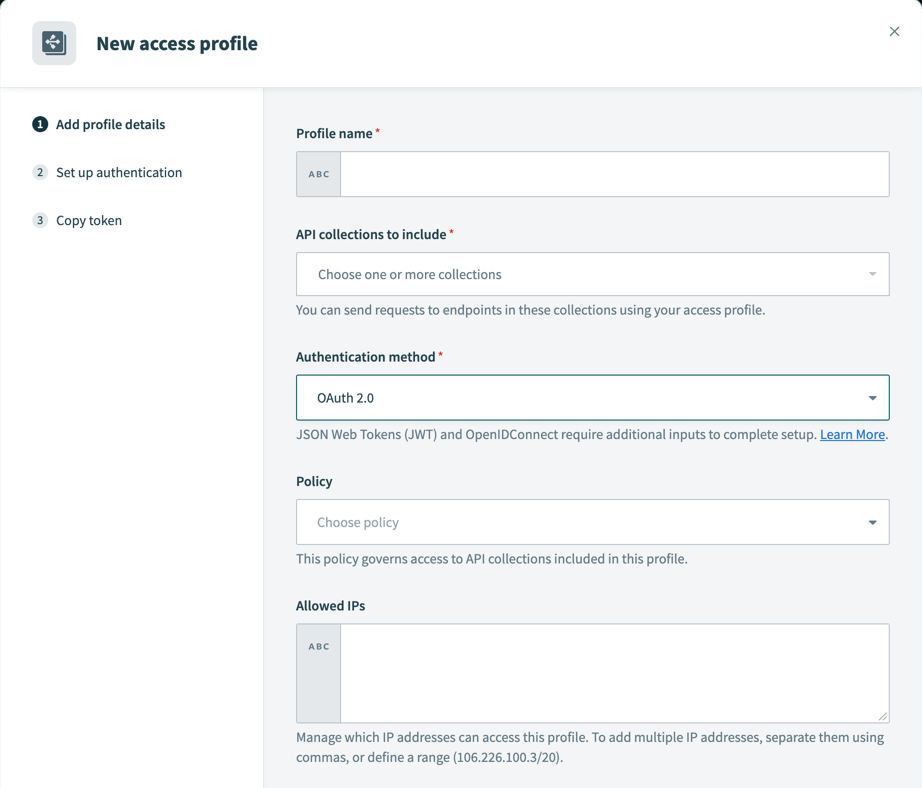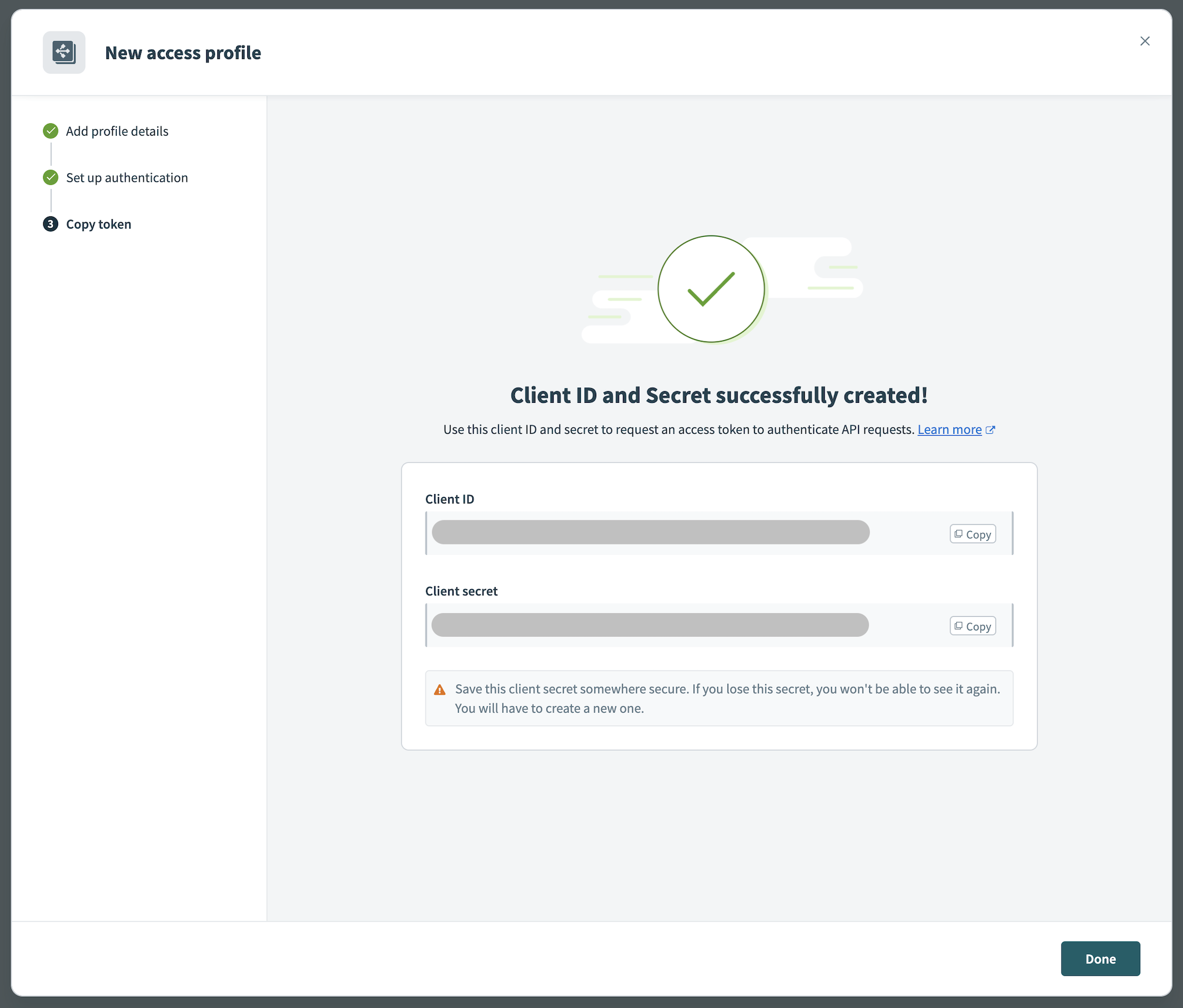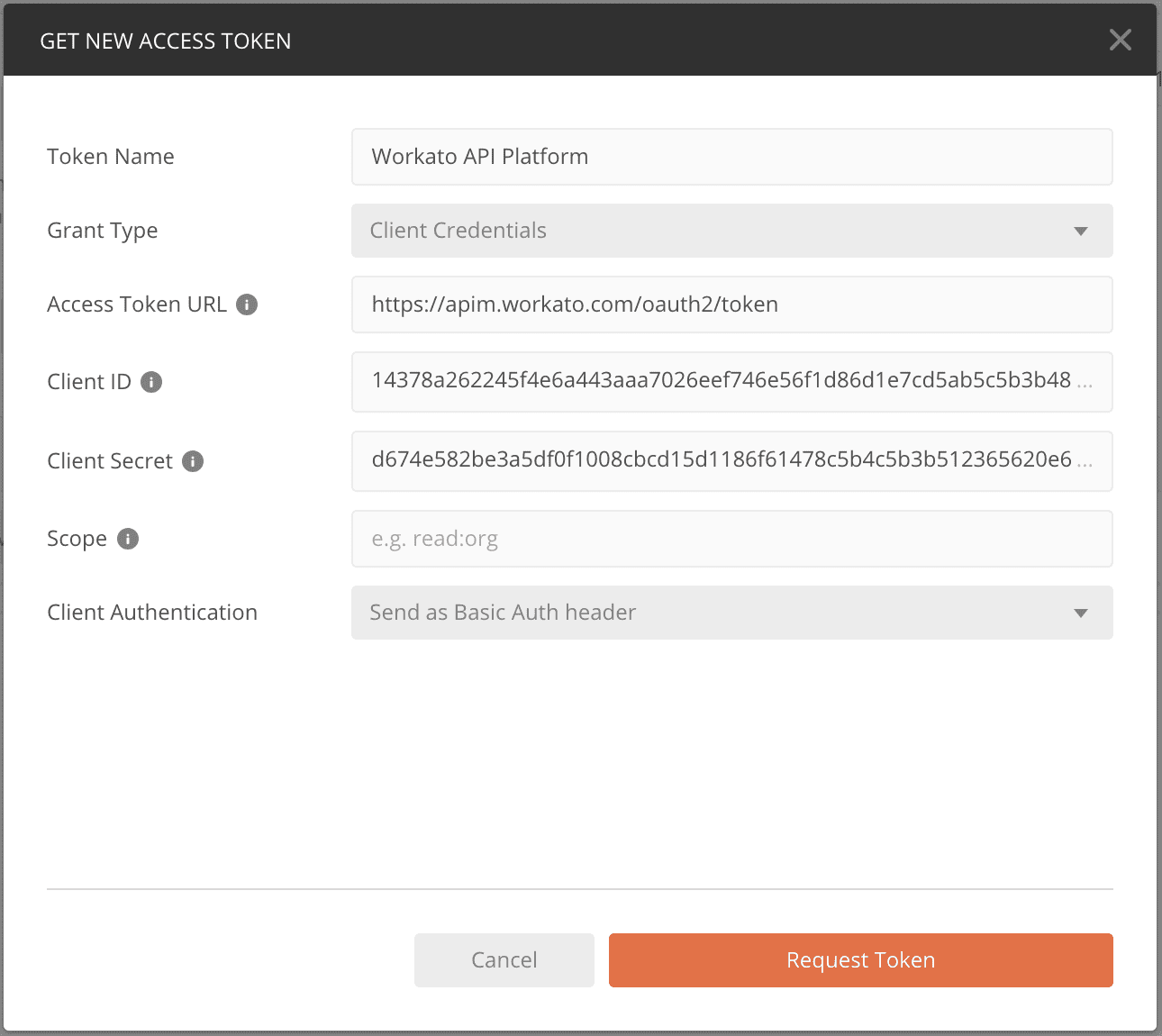# OAuth 2.0 token
Workato allows API platform users to authenticate themselves using the OAuth 2.0 (Client Credentials grant) specification. Instead of a static token, the client makes API requests with access tokens obtained through the OAuth 2.0 flow. Users first obtain an access token from Workato's token request endpoint, after which they can make API calls to Workato API endpoints using the access tokens.
# Set up OAuth 2.0
VIRTUAL PRIVATE WORKATO (VPW) CUSTOMERS
This feature requires configuration steps that are specific to your Virtual Private Workato (VPW) instance. If you are a VPW customer, refer to your VPW private documentation for the configuration details for your instances.
Create a new access profile.
Select OAuth 2.0 as the authentication method.
 Access profile - OAuth 2.0 Authentication method
Access profile - OAuth 2.0 Authentication method
Copy the access profile credentials (Client ID and Client Secret).
 Access profile - OAuth 2.0 Credentials
Access profile - OAuth 2.0 Credentials
# Request access token
| Parameter | Description |
|---|---|
grant_type | Required. Mechanism for authorizing the token request. Must be client_credentials. |
client_id | Required. Client ID obtained from the access profile. |
client_secret | Required. Client secret obtained from the access profile |
Send a POST request to the Workato token request endpoint. The token request must contain the client credentials and grant_type parameter. The RFC (opens new window) recommends encoding the client credentials and sending them as Basic Auth header, using client_id and client_secret as username and password, respectively. See the following example:
POST /oauth2/token HTTP/1.1
Host: apim.workato.com
Authorization: Basic ${Base64(<CLIENT_ID>:<CLIENT_SECRET>)}
Content-Type: application/x-www-form-urlencoded
grant_type=client_credentials
# Other supported formats
We recognize that some HTTP clients may not support this exact format. Workato supports the following alternatives:
CONTENT-TYPE CONSISTENCY
The Content-Type header is required and must match the payload format. Otherwise, the request will be rejected.
# JSON format
POST /oauth2/token HTTP/1.1
Host: apim.workato.com
Content-Type: application/json
{
"grant_type": "client_credentials",
"client_id": "<CLIENT_ID>",
"client_secret": "<CLIENT_SECRET>"
}
# URL encoded body
POST /oauth2/token HTTP/1.1
Host: apim.workato.com
Content-Type: application/x-www-form-urlencoded
client_secret=<CLIENT_SECRET>&client_id=<CLIENT_ID>&grant_type=client_credentials
# Multipart form
POST /oauth2/token HTTP/1.1
Host: apim.workato.com
Content-Type: multipart/form-data; boundary=----WebKitFormBoundary7MA4YWxkTrZu0gW
----WebKitFormBoundary7MA4YWxkTrZu0gW
Content-Disposition: form-data; name="grant_type"
client_credentials
----WebKitFormBoundary7MA4YWxkTrZu0gW
Content-Disposition: form-data; name="client_id"
<CLIENT_ID>
----WebKitFormBoundary7MA4YWxkTrZu0gW
Content-Disposition: form-data; name="client_secret"
<CLIENT_SECRET>
----WebKitFormBoundary7MA4YWxkTrZu0gW
You can also use tools like Postman (opens new window) to generate an access token.
 Generate access token with Postman
Generate access token with Postman
# Token request endpoint
See the following token request endpoints for Workato's data centers:
United States (US)
https://apim.workato.com/oauth2/tokenEuropean Union (EU)
https://apim.eu.workato.com/oauth2/tokenJapan (JP)
https://apim.jp.workato.com/oauth2/tokenSingapore (SG)
https://apim.sg.workato.com/oauth2/tokenAustralia (AU)
https://apim.au.workato.com/oauth2/tokenIsrael (IL)
https://apim.il.workato.com/oauth2/tokenDeveloper sandbox
https://apim.trial.workato.com/oauth2/token
For API platform owners who have enabled custom domains, the token request endpoints will follow the custom domain. For example, for the custom domain api.boltcompany.com, the token request endpoint is https://api.boltcompany.com/oauth2/token.
# Obtain an OAuth 2.0 access token
Upon sending a successful access token request, Workato's authorization server will respond with a JSON object containing the following properties:
{
"access_token": "eyJhbGciOiJIUzI1NiIsImtpZCI6ImFlZTM5NGExZTZiOGZmY2VhZGZhZmRhZDk4ZTJjZTdhNDE0YmU3NWU2ODcyNmNkOTQ3YjBjMmU3OTI1MTUzNGQiLCJ0eXAiOiJKV1QifQ.eyJzdWIiOiJhZWUzOTRhMWU2YjhmZmNlYWRmYWZkYWQ5OGUyY2U3YTQxNGJlNzVlNjg3MjZjZDk0N2IwYzJlNzkyNTE1MzRkIiwiZXhwIjoxNjQ5MzAzMDM4LCJuYmYiOjE2NDkyOTk0MzgsImlhdCI6MTY0OTI5OTQzOH0.TJySFOomyLkvyQHbvQBtm6qGj0bLDqSuUBqbkTSbXm4",
"token_type": "bearer",
"expires_in": 3600
}
EXPIRATION TIME
Access tokens are valid for 3600 seconds. After that, the token expires and cannot be used anymore. Clients will need to generate a new access token to continue making API requests.
Each request to /oauth2/token will generate a new access token with an independent expiration time.
# Use the OAuth 2.0 access token in an API request
Use the OAuth 2.0 access token to make API calls to Workato API endpoints.
Provide the access token obtained in the authorization header, using the bearer authentication scheme. Learn more about making an API request.
curl -XGET 'https://apim.workato.com/prefix/collection/endpoint/call?email=john-doe%40acme.com'\
-H 'Authorization: Bearer <ACCESS_TOKEN>'
# Refresh client credentials
The client secret can be refreshed. We recommend performing this regularly to improve your security posture. Naturally, the old client secret will no longer work after refreshing it. Additionally, previously generated access tokens will be revoked along with the client secret.
Last updated: 6/13/2025, 3:59:26 PM